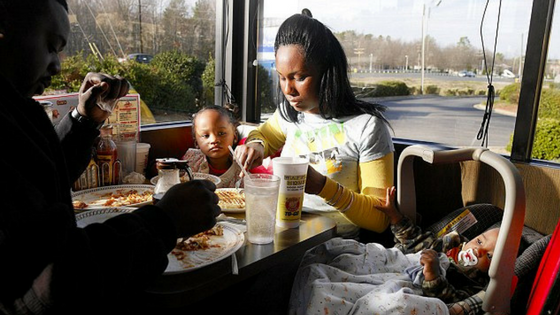How Do Great Leaders Use This Philosophy to Nurture and Grow People in Their Organisation

The Thinking Me:
There are great pleasures in life. Some of which are complex, difficult, and require significant resources if they are to be achieved. Others may occur only once or twice in a lifetime. But some of the greatest pleasures are simple; they are commonplace. For example, sitting down to a meal with your nearest and dearest in your family.
But family mealtimes are changing. Research has shown that only 50% of 20 to 34 year olds eat the majority of their meals at the family dinner table. What's more, the dynamic of the family has changed in the last century, with households growing smaller, relatives spreading out around the country rather than staying in one place, and the traditional template of the husband, wife and clutch of children no longer applying in many cases.
In many ways, what might once have been seen as a standard family mealtime has become more difficult to achieve as time has passed. Difficult, but not impossible.
Preparing a Meal for the Modern Family
This week at Learning Ground, we have been discussing how family meals are prepared and the role that each member of the family plays in this preparation. We have also been asking members to share photos from recent family meals to get a clearer picture of what the modern Australian family looks like, and how bonds and family ties are reinforced during meal times.
The preparation of such meals and such occasions requires leadership. This is not leadership in the sense of a dictatorship, but instead a mutual consensus which moves things in the right direction; in this case, towards the family sitting down and enjoying their meal.
Applying the Principles to Other Areas of Life
We can also apply this elsewhere. Think about other structures in which leadership is required. Think about schools and workplaces, about communities as a whole. If we are to fulfil our leadership roles in those spheres – if we are to make the positive changes in the society around us – an understanding of the 'thinking me' or the 'intellectual me' is required.
This is a deeply ingrained knowledge of ourselves, of our own intellectual capabilities, and of our path forward through growth and development. We need this understanding of the 'intellectual me' if we are to pull our family groups together enabling us to share positive times together. We need the same understanding if we are to drive our businesses or our organisations onwards to success, if we are to create a positive environment for learning in our schools and colleges, if we are to make society a better place for ourselves and for our children.
Ongoing Nurturing and Care
We cannot take this intellectual aspect of ourselves for granted. We can consider it in the same way we might consider a potted plant on display in our home. If we nourish the plant with food and water, it will grow into a beautiful, marvellous show piece. If we neglect it and fail to encourage the growth, it will wither away and die.
As intellectual leaders – in family units, workplaces, and so on – it is up to us to nurture and encourage our own 'thinking' development, but also that of others around us. It is up to us to develop a culture of growth and togetherness, which helps us all to become more aware of the intellectual aspect of ourselves and our capacities for further development.
This is something we are trying to achieve at Learning Ground, during this week's session and over the coming weeks. We will also be covering how the intellectual me gathers its information through sensory stimuli, which will be our topic for next week's post.
Margaret Bell, AM - Founder and CEO of Chain Reaction Foundation.
| Website | Donate to our Purple Heart Appeal | Contact Us | Purchase the Book |
